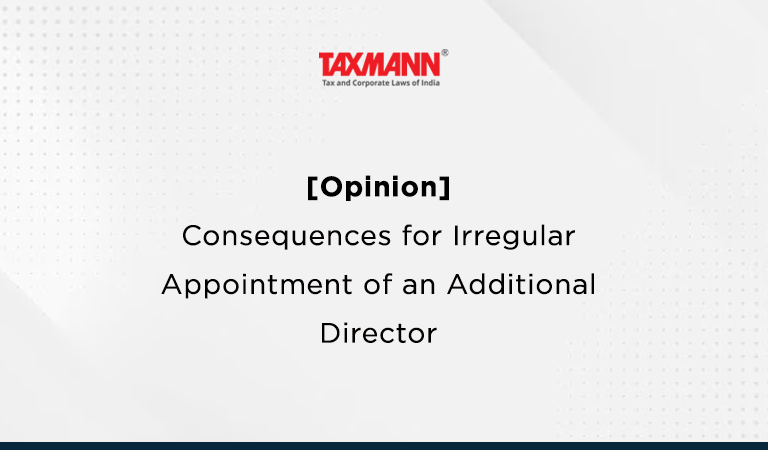[Opinion] Consequences for Irregular Appointment of an Additional Director
- Blog|News|Company Law|
- 3 Min Read
- By Taxmann
- |
- Last Updated on 25 February, 2023

1. Introduction
As per the provisions of the Companies Act 2013, if the Articles of Association of a company may confer on its board of directors, such power is to appoint an additional director. A person who has failed to be appointed through a general meeting shall not be appointed as an additional director and an additional director so appointed by the board, shall hold office only up to the date of the next annual meeting or the last day, on which the annual general meeting should have been held, whichever is earlier. The only care to be taken is that one should keep in mind that the total number of directors including additional directors should not exceed the maximum strength fixed by the Act.
One more important thing to be noted here is that if an additional director, during his tenure had been appointed as managing director of the company, his appointment as managing director also ceases simultaneously with the termination of his directorship at the commencement of the annual general meeting. On the contrary, if such a person was elected as a full-fledged director at the annual general meeting by the members, he will continue to be a director of the company and also as its managing director for the period for which his appointment as managing director had been made under section 196 of the Companies Act 2013 which deals with the appointment of managing director, whole-time director or manager.
2. Relevant Provision on this under the Companies Act 2013
The following are the relevant provisions under the provisions of Companies Act 2013, relating to this case.

3. Penal provisions for violation
The relevant section for penal provisions is spelt out in section 172 of the Companies Act 2013. As per the provisions of section 172 of the Companies Act 2013 (as amended from time to time) if a company is in default in complying with any of the provisions of this chapter (i.e. Chapter XI) and for which no specific penalty or punishment is provided therein, the company and every officer of the company who is in default shall be liable to a penalty of fifty thousand rupees and in case of continuing failure with a further penalty of five hundred rupees for each day during which such failure continues, subject to a maximum of three lakh rupees in case of a company and one lakh rupees in case of an officer who is in default.
4. Consequences of default/violation
To understand the consequences relating to default in complying with section 161 of the Companies Act 2013 read with the relevant rules of Companies (Appointment and Qualification of Directors) Rules of 2014 relating to the appointment of additional director/director, let us go through one of the decided case law on this matter decided on 5th July 2022 – by the Registrar of Companies Karnataka, Bangalore along with order-in-appeal passed by the Regional Director (SER) Hyderabad on 29th December 2022.
Click Here To Read The Full Article
Disclaimer: The content/information published on the website is only for general information of the user and shall not be construed as legal advice. While the Taxmann has exercised reasonable efforts to ensure the veracity of information/content published, Taxmann shall be under no liability in any manner whatsoever for incorrect information, if any.

Taxmann Publications has a dedicated in-house Research & Editorial Team. This team consists of a team of Chartered Accountants, Company Secretaries, and Lawyers. This team works under the guidance and supervision of editor-in-chief Mr Rakesh Bhargava.
The Research and Editorial Team is responsible for developing reliable and accurate content for the readers. The team follows the six-sigma approach to achieve the benchmark of zero error in its publications and research platforms. The team ensures that the following publication guidelines are thoroughly followed while developing the content:
- The statutory material is obtained only from the authorized and reliable sources
- All the latest developments in the judicial and legislative fields are covered
- Prepare the analytical write-ups on current, controversial, and important issues to help the readers to understand the concept and its implications
- Every content published by Taxmann is complete, accurate and lucid
- All evidence-based statements are supported with proper reference to Section, Circular No., Notification No. or citations
- The golden rules of grammar, style and consistency are thoroughly followed
- Font and size that’s easy to read and remain consistent across all imprint and digital publications are applied



 CA | CS | CMA
CA | CS | CMA
